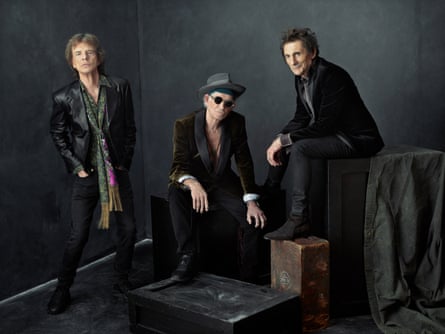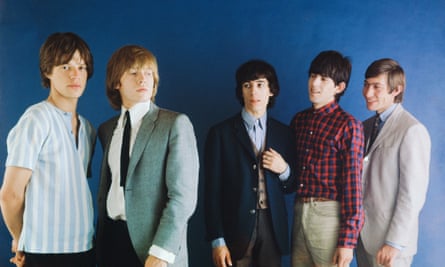The new Rolling Stones album is the band’s best since Some Girls in 1978. Rock critics have been making this claim since the mid-1980s to talk up a series of albums – Steel Wheels, Voodoo Lounge, Bridges to Babylon – so you probably won’t believe me when I say their new one, Hackney Diamonds, really is that good. Better, actually. When I tell Mick Jagger how much I enjoyed it, by this point he’s as suspicious as anyone: “I’ve got really good reactions from people that seem to be genuine.”
They haven’t released an album of new songs since 2005’s A Bigger Bang, instead doing 2016 covers album Blue & Lonesome and a series of high-energy, record-breaking world tours. Jagger turned 80 this year, and with Keith Richards passing that milestone in December, I half expected them to do something like Johnny Cash’s final recordings with Rick Rubin, contemplating the Styx with a downbeat croak, particularly as it comes after the death in 2021 of Charlie Watts, the band’s drummer since they first stepped into a studio in 1963.
But Hackney Diamonds is a remarkably varied record: energised and serene, silly and hurt, pissed-off and spiritually aligned. The supporting cast includes Lady Gaga, Stevie Wonder, Paul McCartney and Elton John, and Jagger himself is uproariously entertaining. “It’s every era of the Stones: 60s, 70s, the dance stuff they were doing in the 80s, a bare-bones Muddy Waters song,” the album’s producer, Andrew Watt, explains later over the phone.

“Not my idea,” Jagger says of that Muddy Waters cover, Rolling Stone Blues, which closes the album. With his airy tone, accent shuttling between Sloane Square and the Thames estuary of his childhood, he sounds rather bitchy, and he quickly realises what he’s said. “I think it’s a great idea! Just not my idea. We’re always known as a bluesy rock band – and yes, we finish on a Muddy Waters song. But we’re very capable of covering genres outside what you would normally think. I’m not trying to say we’re overlooked; I don’t think we are. But I’m glad we do songs like Depending on You” – a yearning ballad – “as well as Bite My Head Off”, a punk rock song with McCartney on fuzz-bass. “It’s a very wide space between those two. That’s what I like about this band: we’re not just willing to give it a go, we’re actually quite good at covering these different genres.”
We’re sitting in a bohemian-posh house on the north bank of the Thames at Hammersmith, rented for a documentary being filmed about the band. Jagger’s been talking about himself all day, and rubs his eyes, which have a touch of milky cloud to them. But he is affable, engaging and open, even if I get the sense there are whole rooms of Jagger’s life that remain closed to the public.
Despite the 18-year gap between albums, he and Richards never really stopped writing. Watt tells me they brought him “60, 70, 80 songs”. Is Jagger kicking himself for not doing an album before now? “Yeah, kind of. That I wasn’t cracking the whip. Keith keeps saying in interviews, ‘When Mick’s ready to do a record, I’ll do it.’ I went, OK? If that’s all I have to say, then great! We’d got into this groove of going on big tours. But there’s no point crying about it now.”
Watt says the band told him: “‘Listen to everything we’ve got, and pick what you like.’ So I did exactly that. Some were demos; some weren’t developed. And there was a whole bunch of material with Charlie that we needed to listen through.” Watts had played on early versions of the songs Mess It Up and Live By the Sword, which were then finished after his death. Steve Jordan, chosen by Watts as a potential heir, played the rest of the album’s drum parts and now tours with the band.
“It’s a couple of years now, and I still think about Charlie a lot,” Jagger says. The day before we meet, he watched their beloved England cricket team thrash New Zealand. “Charlie would have liked Ben Stokes’s innings; I wish Charlie could have seen that 182. I miss his laconic humour. His taste in music. His elegance. His don’t-care attitude – he didn’t get intense. Keith and I get a bit intense.” There was a whole stretch of the 80s where the two were sniping at each other – Richards renamed Jagger “Brenda” and “Her Majesty” – and then again after Richards’ caustic 2010 memoir, which wasn’t kind to the size of Jagger’s manhood, among other things. “But Charlie wouldn’t, and it rubs off a bit – I’m not as intense as I used to be. I think about him when I’m playing, and what he would have played; whether he’d have liked this song, because I’d always bounce things off him. I’d be playing him the silly pop songs of the moment, and he’d love all that.
“But I hate to say this: as you get older, a lot of your friends die.” Does loss ever get any easier? “No, it doesn’t get easier at all. There’s a lot of people around your age, they’re dying all the time. I don’t have any friends older than me, only one. Apart from the band, all my friends are much younger.” He jokily suggests this is self-preservation – “It’s easier that way!” – and gives a morbid chuckle. I wonder if Watts’ death brought home his own mortality, but he counters: “You’re aware of your own mortality from quite an early age – it’s not something that occurs to you in your 70s.” I certainly felt it more when my daughter was born, I say. “I agree – and [having children] started in my late 20s. It’s not a new thing, really.”
That child-rearing hasn’t stopped since; he’s now on to his eighth. From Al Pacino to Robert De Niro, it seems that no roguish male celebrity is complete without having a child well into their twilight years, and Jagger is no different: he had his son Deveraux with girlfriend Melanie Hamrick who was born when Jagger was 73 and Hamrick was 29.

“You get a bit out of practice – it’s not like riding a bike,” he says of restarting fatherhood. “The more children you have, the more laissez-faire you get about them, to be honest. And it depends on the child – they have their own personalities and you can mould them to a certain extent, but you see their likes and dislikes and encourage them to do things they gravitate towards. It’s fun to have children, at any age. But if you’re working, and always away, you don’t get to enjoy it quite as much.” When Deveraux was born, “I wasn’t working so much, so I was able to spend more time. And then we had the lockdown – he’s only six, and two of those years I did almost nothing [with the band].”
It’s tempting, and quite fun, to imagine how many of Jagger’s new lyrics are drawn from his life, particularly the finely detailed Angry and Bite My Head Off, full of the bewildered arguments you might well have with your partner during lockdown. Are these real lovers’ tiffs? “Maybe! It always has to come from somewhere. But you forget all that, and make it into this lighthearted, more exaggerated thing – something amusing.”
He gives me a full-wattage beam as if to dazzle me off this road of questioning, looking just like he does in Jane Bown’s wondrous 1977 portrait of him: eyes crinkled, teeth glowing.

Also taken from his life is the languorous Dreamy Skies, about the joy of the wilderness, which was inspired by Covid lockdown in his country house (“hearing foxes, which I don’t usually take much notice of”). The uptempo Whole Wide World, with Jagger putting an avuncular paw on the shoulder of those down on their luck, drew from further back: that sliver of time between boyhood and becoming a rock star, “when I was living in student digs. I wasn’t desperate, but you don’t know what’s going to happen to you at that age. You get a degree, but then what are you going to do? You’re in a band – and when you get a gig, it goes great, but gigs are few and far between. And you’ve got Brian [Jones] and Keith moaning that they’ve got no money. It didn’t last long, though. We were really lucky – we went from zero to 100 very quickly.”
What about Depending on You, where Jagger sings about being dumped for someone else? “Completely imaginary.” Well, quite – as someone who didn’t so much overlap his sexual partners as tesselate them, he certainly has no shortage of source material for stories of spurned lovers. “You have to go back in your life, maybe, when you were in that position,” he admits, vaguely. “It’s inspired by people, but you have to have imagination. It’s a jilting song. Some of these songs are classic genre songs. In pop music you have the kiss-off, fuck-off song – it’s a classic genre. Then you have the ‘you’re being dropped’ song – this is that one.” Flash! Another beam.

More songs were written in Jamaica (“I knew Keith liked being there”) followed by recording sessions across multiple cities with Watt at the helm. “The great thing about the Stones is how loose they are, how they speed up and slow down, their internal heartbeat together,” Watt says, who recorded them live, without click tracks keeping them in time. Jagger would do his vocal takes wearing a sweater, button-down shirt and T-shirt, as Watt remembers. “The first take, second take, the sweater is still on. End of take two, the sweater comes off. Two more takes. As he’s singing, he’s unbuttoning the button-down, and then he’s in the T-shirt. When he’s in the fucking T-shirt, and he’s on that microphone, watch the fuck out. It’s 100% Jagger. He becomes that thing you see on stage; he would shake when he was singing notes, he would drip with sweat.”
Inspired in part by Bob Dylan, Jagger would deliberately un-finesse his vocals, as on Depending on You when he lets “you” atonally fall away. “Both Mick and Keith were like: it’s not Dylan enough,” Watt says. “It’s anti-singing, it’s almost speaking; he has such attention to detail in his voice, of making it not too good. That’s so cool. Every other singer I’ve worked with is like: I can sing that better. He’s the opposite: I could throw that away.” Jagger even hung around for the mixing. “I’ve never worked with anyone that worked as hard as him, ever. He was making sure you could hear a snare all the way through the song, that you could hear Keith and Ronnie and their interplay. Singers are usually, ‘Here’s my vocal, you do the rest.’ But he cares so much about this band, and how everyone is represented.”
There are of course still plenty of unreleased songs in that 80-odd cache, including “some other tracks we’ve done with Charlie that’ll probably come out,” Jagger says. “So he’s kind of still there – and I hope he likes the rest of the record.”

Also in the vault are “social comment songs”. “The trouble with social comment is that it goes out of date really quickly,” he says. We are speaking before the Israel-Hamas war, but Jagger’s been fretting plenty about politics, particularly “the polarity of opinion in the US, the unforgiving nature of people not understanding each other, the lack of cooperation. And it spills over into other countries, too. The US is very influential on European opinions and mores. There’s this semi-autocratic drift. Maybe I’m wrong – maybe these semi-autocratic governments would have happened anyway.”
He admires Australia for making voting mandatory, which he says keeps the extremes dampened down. “Not everything has to be compromised, but people do have to work together more. When we have extremists controlling the agenda, we get into trouble. I do see extremity on both sides [of the political spectrum].”
In the UK as well? “Not as much, but America is worrying, because if we get extremity governments in America, we get into too much fighting. People don’t really understand what they’re talking about half the time, to be honest. I’m sorry, they just don’t. And they have very strongly held views.”
With his almost comically abundant hair, sharp mind and sweaty vocal takes, you sense that Jagger will be around for a few more administrations yet, democratic, semi-autocratic or worse. One of the big pleasures of Hackney Diamonds is listening to him and his band stake out a new frontier for rock’n’roll: “There’s never been anyone else that has been a group for this long that has made an album this good at this point in their career,” Watt says, and it’s a fair statement. “Listen to his vocals, man – there’s no difference between 18 and 80.”
Nonetheless, Jagger is still asking himself: “How long can you really do it? It’s like asking: how long can someone go on playing for England? Not long, is usually the answer.” I ask if he dwells on that. “I do think about it. But I write all the time. You’ve just got to keep writing, and now everyone [in the band] can see they can record quite easily. It was only three weeks in the studio. It’s not difficult. Too much angst went into recording before. If it’s no good, it’s no good; if that track doesn’t work, another one will. Do it!”

Comments (…)
Sign in or create your Guardian account to join the discussion